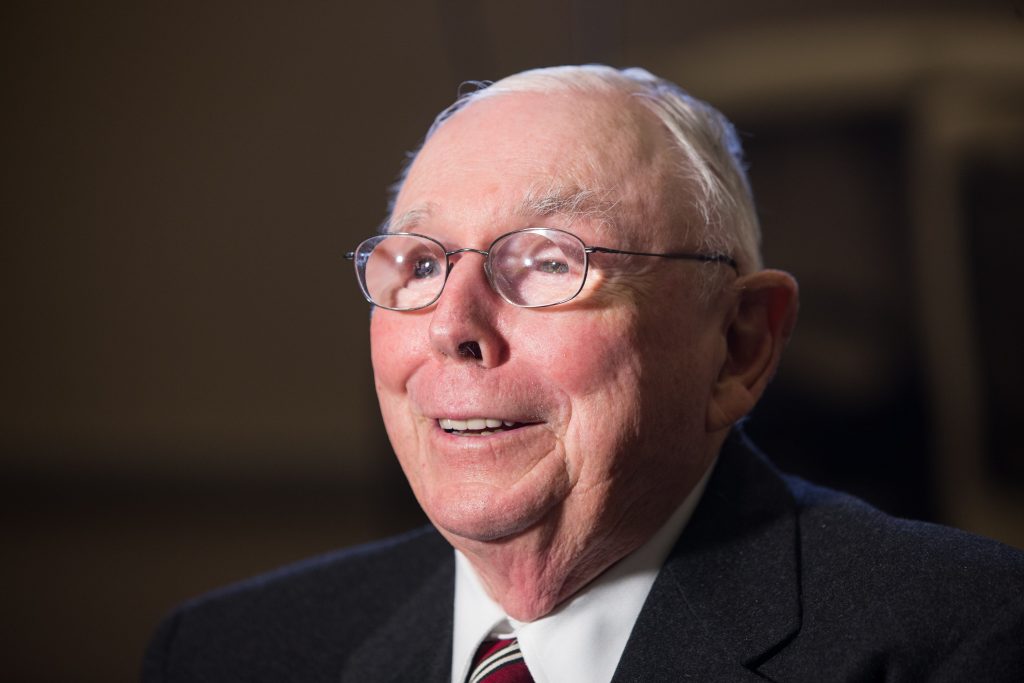
Charles Munger, who stood as a remarkable pillar in Berkshire Hathaway’s development for nearly six decades alongside Warren Buffett, passed away at 99 on 28 November 2023. Munger was fundamental in the transformation of Berkshire Hathaway from a struggling textile production company into a global powerhouse.
His passing occurred in a California hospital on Tuesday, as reported by the firm. Known for his long-standing residency in Los Angeles, Munger’s vast contributions have not gone unnoticed.
“Without Charlie’s invaluable inspiration, wisdom, and involvement, Berkshire Hathaway wouldn’t be where it is today,” Buffett articulated in the statement.
Born in Omaha, Nebraska in 1924, Munger was more than just the business partner and right-hand man of Warren Buffett. He was a man of versatile talent and profound wisdom, an entrepreneur, lawyer, real estate developer, and no doubt an icon in finance. Best known as Vice-Chairman of Berkshire Hathaway Corporation, Munger’s investment strategies and business acumen have left a lasting mark on the finance world.
From 1985 to 2023, with Munger at the helm, the stock price of Berkshire Hathaway saw an impressive surge of more than 2,400%.
Such phenomenal growth was not an accident, but a result of years of consistent, ethical, and meticulous investment. Munger was truly a master of his craft, learning, understanding, and reinventing concepts to create a wealth-creation machine that is Berkshire Hathaway.
“I believe in the discipline of mastering the best that other people have figured out. I don’t believe in just sitting down and trying to dream it all up yourself. Nobody’s that smart.”
– Charlie Munger
The 9 Key Takeaways
Munger may be best known as the long-time business partner of Warren Buffett, but over the years, his contributions to finance extend far beyond Berkshire Hathaway. His impact on the world of investing and decision-making is deep and highly influential, leaving a rich intellectual legacy that continues to influence many to this day. His work, ideas, and philosophy gave a new perspective on investing and reshaped the way we approach decisions.
1. Mental Models
Munger championed the concept of “mental models.” They are powerful constructs that help you, as an investor, simplify and streamline your financial decision-making process. You might think of mental models as tools for understanding and filtering complex information, promoting clearer and more effective decisions.
Perhaps you’re familiar with Munger’s innovative “latticework of mental models“, his unique methodology that interconnects various thought structures. This latticework provides you with a robust framework to traverse the often-convoluted financial terrains. It’s a remarkable system that integrates insights from disparate fields, like psychology, history, and economics, offering you a comprehensive perspective on investment strategies.
Both academia and the pragmatic sphere of finance have embraced Munger’s mental model philosophy, testifying to its effectiveness and universal appeal. There are countless institutions and financial experts who have seamlessly integrated this approach into their curriculum and strategic plans. It’s a testament to the enduring influence and applicability of Munger’s teachings.
When you as an investor deploy mental models, they facilitate the integration of knowledge from various disciplines. This fosters a profound understanding of businesses and sectors. He inspires you to widen your viewpoint, consider multiple perspectives, and boost your creative problem-solving abilities. By advocating for mental models, Munger emphasizes the pitfalls of narrow-minded techniques and highlights the importance of a diverse, multi-disciplinary approach. It’s a strategy that you, as an investor, can apply to enhance your financial pursuits and life decisions.
2. The Art of Long-Term Value Investing
Together with Warren Buffett, Munger brought into mainstream recognition the philosophy of ‘value investing.’ A timeless investment strategy, value investing underscores the importance of purchasing stocks at a price beneath their intrinsic value.
In simpler terms, this patient, long-term perspective advocated that good investing had the philosophy of buying and holding onto stocks of profitable companies, as opposed to constantly trading.
At a time of fast-paced, high-frequency trading, Munger’s approach to supporting long-term investments, often seen as almost contrarian, showcases his visionary thinking. His insistence on comprehending the fundamental, sustainable aspects of businesses crucially shifted the focus from transient stock values to long-term business models.
His emphasis on deciphering the roots of businesses forms the cornerstone of the ‘buy and hold’ strategy he propagated. This method ardently suggests acquiring stakes in well-understood, fundamentally robust enterprises and retaining them for an extended timescale. He also trumpeted that, by focusing on the essential features of businesses, investors could discern between profitable, sustainable investment prospects from the real risks at hand. This thorough comprehension roots every investment decision in a concrete, fact-checked understanding, ensuring it’s designed to withstand market volatility over time. Consequently, the ‘buy and hold’ scheme becomes less about speculation and more about calculated, informed choices, immortalizing Munger’s strategy in the annals of strategic investment.
3. Inversion
“Invert, always invert.”
– Carl Jacobi, 19th century mathematician
Munger’s famous quote became a reminder for many to consider problems from different angles and seek out solutions from a reverse perspective. He also applied this innovative way of thinking to find investment opportunities.
The concept of inversion, involves thinking backward and considering the potential pitfalls and risks before deciding. By focusing on avoiding mistakes rather than solely seeking success, investors can improve their decision-making process and minimize potential losses. This approach promotes a more cautious and disciplined approach to investing.
Consider an example where you’re evaluating the decision to invest in a newly emerging tech startup. Instead of just focusing on the potential of huge returns, following Munger’s principle of inversion, you would first consider all the things that could go wrong. Perhaps the technology isn’t as cutting-edge as it seems. Maybe the team isn’t as experienced in the sector as they should be, or the market might be highly competitive with significant entry barriers.
This thinking process doesn’t necessarily discourage you from investing, but it helps mitigate risks by ensuring you’re not overlooking potential pitfalls. It’s also important to note that Munger’s inversion principle was not limited to investing. He widely advocated for its usage in everyday decision making and problem-solving.
4. Circle of Competence
Munger emphasized the importance of understanding one’s own limitations and staying within areas of expertise when making investment decisions. This concept has helped investors avoid unnecessary risks and make more informed choices. He himself applied this principle by focusing on investments in areas he knew well, like the finance and consumer goods sectors.
One classic example of Munger’s application of the ‘circle of competence‘ is evident in his and Warren Buffet’s decision to purchase Coca-Cola stocks for Berkshire Hathaway in 1988.
Despite the stock market’s apparent uncertainty, both Munger and Buffet acknowledged their understanding of the worldwide consumer demand for Coca-Cola products. Their expertise in the consumer goods sector allowed them to recognize the long-term value of this investment within their ‘circle of competence.’ As a result, they confidently made the purchase, which ultimately proved to be one of their most lucrative investments. This case serves as an instrumental testament to the importance of recognizing one’s own areas of expertise when making investment decisions.
5. The Pursuit of Ethical Investments
Munger strongly promoted ethics in investment choices. He believed the idea that the goal of an investor should not only be to maximize returns, but they should also consider the ethical implications of their investments. This resonates with the ongoing rise in ESG (Environmental, Social, and Governance) investing.
“The best thing a human being can do is to help another human being know more.”
– Charlie Munger
This ethos is seen in Munger’s approach to his investments – pushing for value in companies that are not only profitable but also have a positive impact on society. His investing philosophy, oftentimes, embodied a blend of sound financial analysis coupled with a clear moral compass. This emphasis on integrity has also helped shape a more responsible and sustainable approach to finance.
Munger, in his life’s work, wholeheartedly advocated for ethical investment and demonstrated it through his many ventures. One notable example of his altruistic approach to investment, was with BYD Company, a Chinese manufacturer of automobiles and rechargeable batteries.
In 2008, when he discovered BYD, led by its CEO Wang Chuanfu, he was impressed with the company’s commitment to renewable energy and sustainable transportation. Munger could foresee the transformative potential of this emerging industry and presented the company to Warren Buffett. This move led to Berkshire Hathaway purchasing 10% of BYD, thereby promoting and supporting a company dedicated to mitigating the adverse impact of non-renewable energy consumption.
Another example is Munger’s much-publicized aversion to investing in tobacco companies. Despite the promising profits, he had consistently avoided these companies due to their negative impact on public health. This instance encapsulates Munger’s belief that ethical considerations should not be separated from business decisions. His prioritization of public well-being over quick profit returns is a testament to his ethical investment approach. Through his life, Munger showed us that profit is not the only measure of a company’s value; its societal impact matters in equal measure.
6. Embracing the Lifelong Learning Journey
Few could inspire the adoption of a learner’s mindset the way Munger did. He emphasized that continuous learning and adapting to new information is fundamental to making good investment decisions. His steadfast curiosity and lifelong learning have left an indelible mark on investment philosophy to this day.
“In my whole life, I have known no wise people (over a broad subject matter area) who didn’t read all the time—none, zero.”
– Charlie Munger
His words succinctly express the rationale behind his mental model approach and his insatiable curiosity. His belief in the power of reading and the accumulation of knowledge has influenced countless investors and professionals to adopt a lifelong learning mindset, enabling them to adapt to changing market conditions and stay ahead of the curve.
Charlie Munger’s commitment to continuous learning wasn’t just a mantra; it was the cornerstone of his phenomenal success in the financial world. He espoused the idea that an investor’s worth is largely based on what they know and understand. For Munger, this wasn’t confined to traditional investment knowledge. Recognizing the interconnectedness of disciplines, he encouraged a diverse knowledge base that spanned across economics, psychology, history, and more.
This learner’s mindset allowed him to identify opportunities and risks that others often overlooked, demonstrating how an investor’s range of knowledge could directly impact their investing success. Therefore, his lifelong learning philosophy could be seen as a blueprint for successful investing in our dynamic world.
7. The Power of Patience Paired with Rational Thinking
For Munger, rationality and patience were central to sound investing. He urged investors to hold their investments for the long term, supporting this approach with his own actions by holding stocks such as Coca-Cola and American Express for decades.
For him, investing was not merely a matter of intelligence, but a test of temperament. Munger believed that patience played a significant role in investment success. The capacity to wait for the right opportunities, to not be swayed by market fluctuations, and to resist the impulse to follow financial trends—these were the traits that Munger highly valued in an investor. His philosophy of ‘Sitting Tight’ has left a profound impact on the investment world.
Munger’s work emphasizes the significance of long-term thinking and patience in investing. He advocated for a buy-and-hold approach, encouraging investors to focus on the intrinsic value of a company rather than short-term market fluctuations. This perspective encourages investors to resist the temptation of short-term gains and instead focus on the long-term potential of their investments.
8. The Spirit of Giving Back
Beyond his remarkable influence on the field of finance and investing, Munger leaves a legacy as a generous philanthropist.
He contributed to various charities throughout his lifetime, including a staggering $200 million donation to the University of California for the construction of new dormitories. Furthermore, over the years, he also made significant contributions to other esteemed higher education institutions, such as Stanford University and the University of Michigan. His philanthropic efforts were a testament to his profound belief in the power of education and learning as invaluable tools not only for personal advancement but also for societal growth.
9. Into the Mind of an Investor
In stark contrast to the prevalent ‘quick win’ mentality in the financial world, Munger was an advocate of a gradualist approach. He famously said, “The big money is not in the buying or the selling, but in the waiting.” This piece of wisdom has decisively shaped the way investors and professionals approach decision-making and risk management.
His emphasis on the importance of comprehending the underlying businesses before investing has helped shift the focus from quick, short-term speculation to long-term value creation. It is through Munger’s significance on investing in high-quality companies with durable competitive advantages, that countless investors have been guided to practice patience and to persevere even in the face of market volatility.
The echoes of Munger’s influence can also be clearly heard within the realm of behavioral finance. His philosophies, especially his “Psychology of Human Misjudgment“, have radically reshaped our comprehension of cognitive biases. They have reinforced the rather critical notion that recognizing and countering these biases can indeed lead to more successful investor outcomes.
What Is the Future of Value Investing in Light of Charlie Munger’s Passing?
Will Munger’s departure change the landscape of value investing? The short answer is no; the long answer requires an understanding of Munger’s philosophy. Munger always emphasized the need for adaption and innovation as key components of the investment strategy.
“The stock market doesn’t dance to the same tune across time”, Munger once said, suggesting that investment strategies should evolve according to the changing economic landscape.
Looking ahead, there are a few paths that we, as value investors, can anticipate.
Firstly, individuals engaged in value investing will need to possess a profound understanding of businesses and sectors they invest in. This “no-depth-no-dive” approach, as Munger would put it, ensures that investors are not simply throwing darts blindly but making diligence-backed investments.
Secondly, there will be a pressing need to stick with the fundamental principles of value investing, despite market whims or fads. This means continuing to prioritize businesses with strong balance sheets, exceptional management, and a clear competitive advantage.
Thirdly, while the markets might occasionally veer towards different investment styles – such as growth investing, the overall principles of value investing will continue to hold their relevance. That’s because, at its core, value investing is about making sound financial decisions instead of chasing temporary market trends.
Lastly, let’s not forget that Munger’s philosophy was never about following a strict rulebook. Rather, it was about continuous adaptation based on real-world scenarios and contexts. Therefore, the true legacy of Munger lies in embracing originality and flexibility, while staying grounded to the principles of value investing.
“Remember that the stock market is a manic depressive.”
– Charlie Munger
As we mourn the irreplaceable loss of Charlie Munger, it’s an understatement to say his absence is keenly felt across the global investment community. Despite Charlie Munger’s absence, his legacy occupies an influential position in the world of investment through the eternal principles that he passionately disseminated. These principles sustain the importance of value investing for the generations to come. Let’s remember him not just as an exceptional investor, but as a far-seeing mentor who drew a definitive route for us moving forward.
It falls upon each and every one of us to honour and bear witness to the indelible mark he has made on the landscape of business. With hearts full of respect and eyes brimming with tears, we bid farewell to a legend whose teachings will continue to serve as beacons in the unpredictable world of investing.



